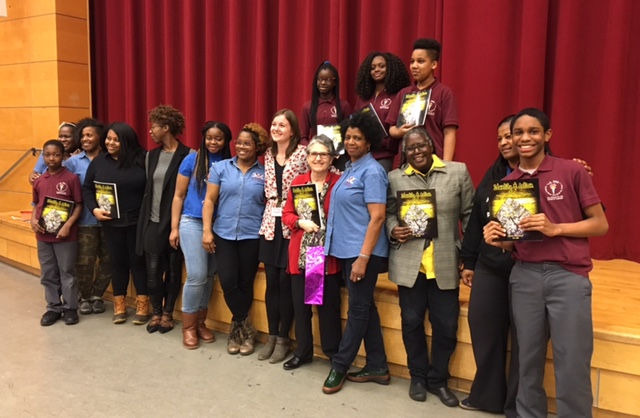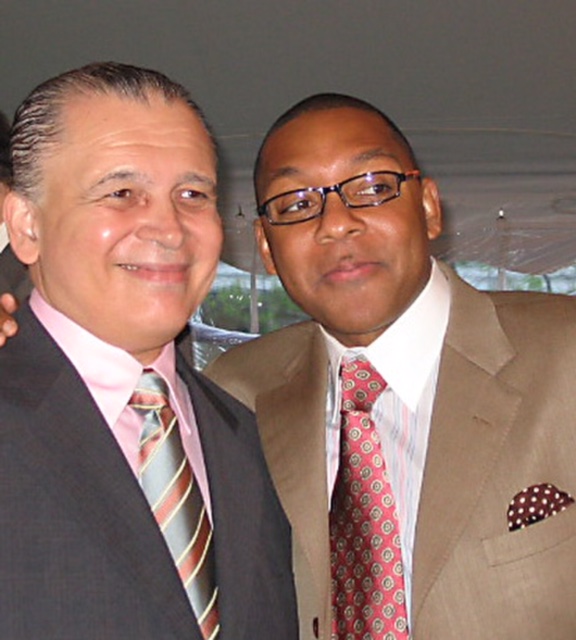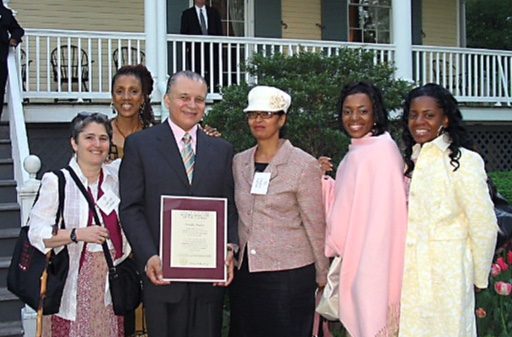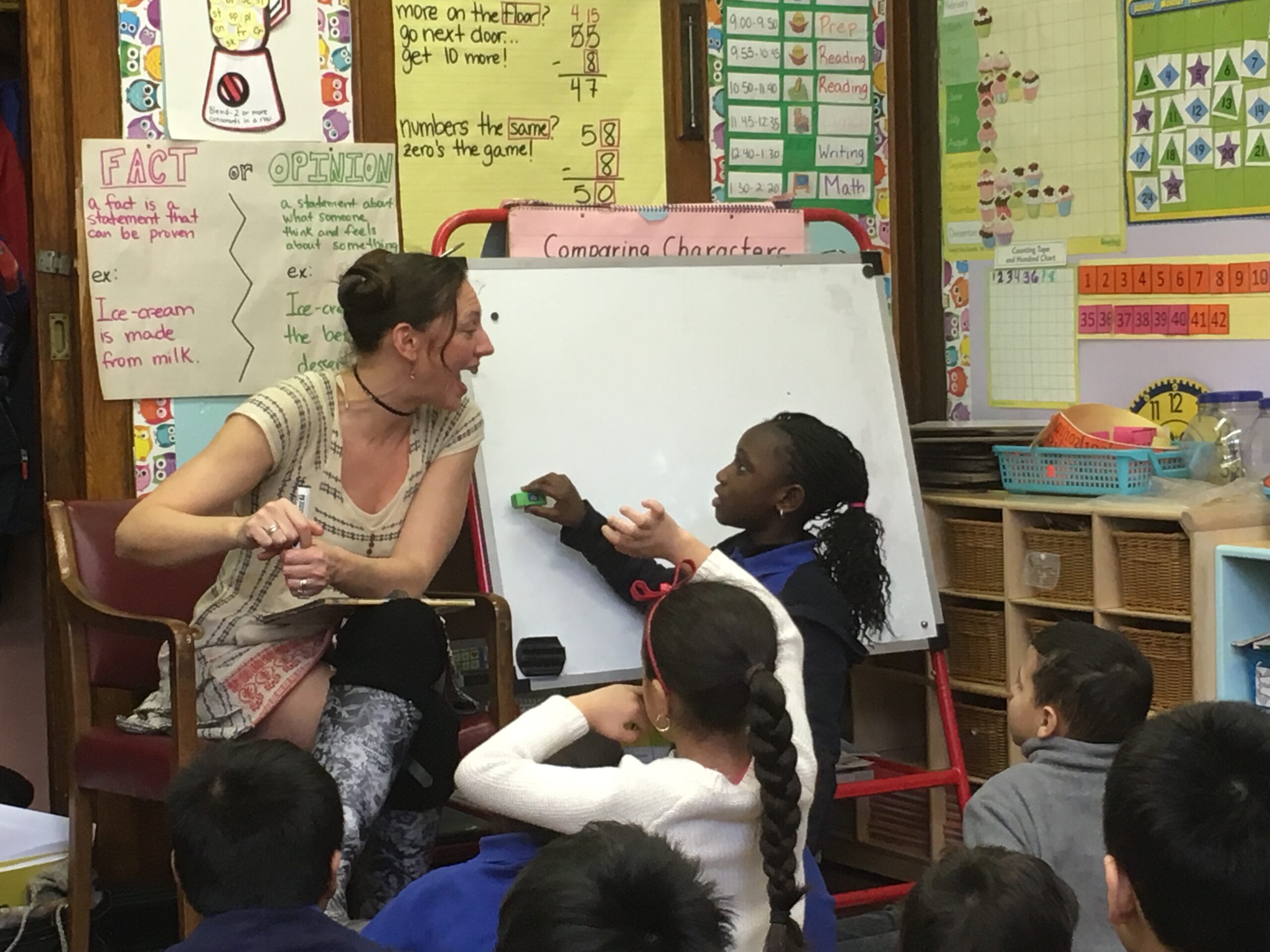“Poetry is so hot, it makes June butterflies/party in my stomach.”
—From a fifth-/sixth-grade class poem at PS 156
Yes! I celebrate Teachers & Writers’ 50th birthday with all of the gratefulness of a child witnessing his or her first poem published in a book, an event I’ve had the privilege of witnessing a good 50+ times in my life. Absolutely nothing in my life brings me a greater joy than midwifing poetry with kids; not since I was 16 some 44 years ago, when my old fifth-grade teacher launched my passion for this work by inviting me to bicycle weekly to her class to teach poetry writing.

Although prematurely retired now due to Parkinson’s, the simple truth is this: although I’ve found fulfillment in other careers as a classroom teacher and later as a individual and family therapist, nothing has ever sent me soaring through space like four or five hours riffing with grade-school kids about the creative use of words—published poetry and their own. Yes, just writing this reminds me how seriously addicted I used to get to the pops and crackle in the air in the creation of a class poem as hands shot up, phrases were shouted out and scribbled onto the blackboard—like “The rain swims freely in the night/ spinning like a heart in a rabbit hole”—and then students would put teeth-bitten pencils to paper and begin to write their own brand-new original work. I was intoxicated every time a student nervously called me over to show me their first few lines, or let me read them aloud to the class, and then either watch my jaw drop in awe or hear their peers clap for them and realize how powerful an effect a few words can have on another human being. Whose heart wouldn’t drop when hearing, “Eat Haiti, and you taste the sun/ just bursting in my mother’s mouth.” or “The moon swims in a never-ending pool/ as the Twin Towers fall.”
Over several decades, Teachers & Writers offered me poetry residencies in innumerable schools, ultimately landing me at PS 156, Waverly School for the Arts, in Brownsville, Brooklyn. Incredibly, my dad had attended kindergarten there in 1917, and for over eight years I participated in more than 25 residencies, including interdisciplinary, Annenburg Foundation-funded, 12-week “arts strands” on various themes. These programs culminated in public student performances where they read their strand-specific poems; danced what they’d learned from professional dancers of diverse cultures; and made music from drums, steel pans, or other instruments.
In these 12-week Annenberg strands, the students, their classroom teachers, my fellow resident teaching artists from the dance and drumming worlds, and I together explored a wealth of diverse cultures. We studied several African countries and created music and poems about apartheid:
Mandela, you are the mountain in the valleys.
Mandela, you are the furious tiger in the jungle.
Mandela, you are owl eyes protecting us in the darkness.
We studied the verse and steel pans of the Caribbean; the particular chants and myths of numerous First Nation Tribes; the history, poetry, art and music of Flamenco, Latin America, the Harlem Renaissance:
Conjure Woman, conjure me back my real dad.
Collect your magic potion out of green leaves and apples.
Spin it with a spoon
Bring me my real dad.
And we studied and wrote poems inspired by American jazz:
Midnight sneezes
when the dandelions
burst openWe speak ‘Trane.
Your train shakes me when the train moves.
Trane, when you talk to me, you shake my fast heart.
My lesson plans evolved from my studies, especially as I listened to music from the current strand, and some of the most astonishing poems sprouted from my students’ pens—inspired by, and at times unrivaled by, some of the world’s best published adult poets. Here are a few exhilarating examples, including from special needs classes, often the most lyrical and poignant writing.
To Dizzy Gillespie and Lester Young:
Your horns play the black skin of the difficult city
About Louis Armstong:
His voice is the fresh way we feel just after a bath
And:
Lady Day, you dazzle me in blushes and laughter
Satch makes moonlight rise,
a smooth touch of cotton and silkReggae, you spin me
like gold…
Reggae, you knock the shoes off my feetMidnight, spread your wings.
Flowers bloom and groom on the tip of my midnight fingerMusic, take me and rock me
in your jello arms.
Make my blind folks see holographs bark
from the moon and sun.
Fly me.When I drink water
I drink the skySaxophones wet my face at dawn
Nobody’s grandmother can take her teeth out
like my grandmother.My eyes are the sky
when the sun is up.
Teachers & Writers made it possible for me to remain in one school for a glorious 25+ residencies; it was Nirvana for any teaching artist, and certainly for me. With this kind of adventure, I effectively became part of the school’s staff and “family,” earning trust and facilitating solid, long-lasting relationships, all of which deepened the quality and effectiveness of my collaborative work in the classroom. From this came inclusion in end-of-the-year staff parties, an invitation to speak at the 2006 fifth-grade graduation, and the gratification of watching my favorite teachers become assistant principals and then principals. I watched as PS 156, an elementary school, grew a new middle school, IS 392, on its upper floors, funneling in some of the graduating lower school’s kids. For me, the icing on the cake was the number of students with whom I was lucky enough to work from first grade to sixth grade, and whose writing and personalities I got to see unfold and thrive.

The harder part was grieving with teachers and parents at a child or parent’s funeral, and being entrusted with the intimate details of student and staff lives. Maybe the hardest moment for me was on one anthology celebration day, hearing the news that the father of one fifth-grade student (to whom he’d just written the poem he planned to read that day, about the father’s love of Billie Holiday) had shot that student’s mother to death the previous weekend.
With the assistance of T&W, and the teachers and administrators, I was able to bring the poems of my remarkable student-poets out of the school building and into unexpected spaces: into the pages of the New York Times (our jazz strand); onto the walls of a local Brooklyn restaurant in the months after 9/11; into First Nation classrooms in New Mexico and Michigan in a poetry pen-pal exchange; into a book about empowering students to cope with war through poetry, Nurturing the Peacemakers in Our Students; and into the studios of WNYC Radio with poems about the perils of living in Brownville:
The wind writes to me
of danger on my block
of shootings by gangs.
It warns me to stay away from trees
and from windows
that could break and make you bleed,
and of strangers in their cars.

I brought the poems into a funeral home to be read by parents of a student who died of pneumonia at age 10; into the offices of local legislators and police precincts concerned about gang-related crime; to Gracie Mansion, the Mayor’s residence, where our school principal, Oswaldo Malave, was honored along with Wynton Marsalis and Chita Rivera and included one of my students’ poems in his speech; and into the teaching repertory of the Annenberg Foundation, which recorded our school’s teaching partners in an entire Africa-themed poetry strand which they had funded.
Teachers & Writers, I salute you. Thank you.
Below is the poem read at Gracie Mansion in 2006:
On Your Feet
On Your Feet
My poem has a mind of its own.
It walks through the streets on its paper feet,
follows the words that surround it,
speaks its mind as it buries itself in the moonlight.
It wants to be heard.
It wants to be found,
but it sees no one around.
—Nigeria Tate, sixth grade
Leonore Gordon lives in Brooklyn, New York. She is a retired licensed family therapist, a poet, a longtime poetry educator with T&W, a writer, and a social activist. Her poetry, nonfiction articles, and translations have appeared in a variety of publications, including Teachers & Writers Magazine, The Council on Interracial Books for Children Bulletin, Contemporary Israeli Literature, Triquarterly Review, Nurturing Peacemakers in Our Students, and in the anthology Rethinking Our Classrooms. Gordon has been a political activist all of her adult life, and as a result of her diagnosis of Parkinson’s Disease in 1999, she is now educating health-care professionals and members of the PD community through presentations, articles and a blog about living with PD.



